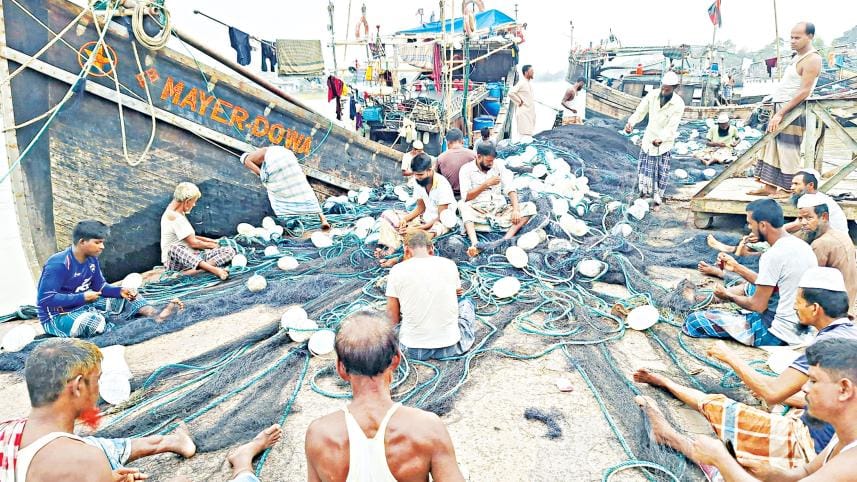Fishermen get just over half maund of rice for 22 days

- Hilsa ban leaves fishermen awaiting promised aid
- Rice allocations delayed, cash support absent
- Rising inflation deepens hardship in coastal communities
- Experts urge stronger, targeted social protection
With low hauls from the sea throughout the year, Masum Billah, a 42-year-old fisherman from Dhulasar village near Kuakata in Patuakhali, was already struggling to feed his family of five. Now, with a 22-day ban on hilsa fishing in effect, he has no choice but to depend on government aid under social protection scheme for survival — aid that has yet to arrive.
"With the ban, I'm now without work," Masum said quietly. "The government promised 25 kilogrammes (kg) of rice for each registered fisherman, but I have yet to receive mine."
"The local administration says the rice will arrive soon, but rice alone cannot sustain a family. How am I supposed to buy oil, salt, and other essentials?" he added.
Like Masum, thousands of fishermen across the coastal belt are enduring hardship during the fishing ban, which began on October 4 and will last until October 25 to protect brood hilsa during its peak breeding season.
"I am the sole breadwinner for my six-member family. Last year, we requested Tk 5,000 in cash along with rice from the fisheries officer, but we only received the rice," said Shah Alam, another fisherman from the same village.

Community leaders and traders say the struggle of fishermen has worsened amid persistently high prices of daily essentials. They have urged the government to increase rice allocations and provide additional assistance, including cash support, during the ban period.
"Fishermen are among the poorest communities in the country and have long called for both rice and cash assistance. However, their appeals have largely gone unheard," said Raja Ahmed Raju, president of the Fish Traders' Association at Mahipur Fish Landing Centre in Kalapara.
"A family can't survive on rice alone. The government should also provide other essentials or at least some cash support. Unfortunately, no action has been taken so far," he added.
According to data from the Bangladesh Bureau of Statistics, the country's headline inflation rose slightly to 8.36 percent in September from 8.29 percent in August, with food and non-food prices continuing to strain household budgets.
Bangladesh currently has about 17 lakh registered fishermen working across rivers, haors, baors, canals, and other water bodies. Of them, around 7.42 lakh are involved in hilsa fishing, according to the Department of Fisheries (DoF).
However, due to limited allocations, assistance this year could be extended to only 6.2 lakh fishermen, said Mohammad Faruque Moyaduzzaman, an assistant director at the DoF.
"Last year, during the hilsa ban, fishermen were given 14,164 tonnes of rice across the country. This year, the allocation has increased to 15,503 tonnes," he said.
A proposal was also submitted to increase rice support during the 58-day ban from 40 kg to 50 kg per fisherman, and during the 22-day ban from 25 kg to 30 kg.
"Despite the clear need, the proposal was not approved by the authorities due to budgetary constraints," he added.
Abdur Rouf, director general of the DoF, said about half of this year's allocations have already been distributed and the rest should be completed by October 10.
"Due to the Durga Puja holidays, the process was delayed. We submitted our demand but received a limited allocation, which we are now distributing," he said.
"The allocation was insufficient. We couldn't cover everyone. This decision comes from higher authorities," he added. Local administrations echoed similar delays. Masudur Rahman, chairman of Golkhali Union in Galachipa upazila, said, "Rice allocations have arrived but have not yet been distributed. We'll start within a few days."
He added that authorities were also conducting drives to ensure compliance with the fishing ban.
In Barguna, Golam Mostafa Chowdhury, president of the District Trawler Owners' Association, said, "Protecting hilsa is vital, but we must also protect fishermen's livelihoods. The government should provide both rice and cash support."
Economists say the crisis facing fishing communities is a reflection of structural weaknesses in social protection.
Selim Raihan, professor of economics at the University of Dhaka, said that while hilsa remains abundant in the market and is selling at exorbitant prices, fishermen receive only a fraction of the profit.
"Based on value chain analysis, most benefits go to those higher up the supply chain," he said.
"The current support, such as rice allocation during the 22-day ban, is clearly insufficient for fishermen's expenses. It seems unlikely that a family can manage solely on rice without additional aid," he said, stressing the need for targeted social protection programmes for fishing households.
"Many studies suggest cash transfers are more effective than in-kind support because cash provides flexibility," Prof Raihan noted.
"Fishermen might sell the rice to cover other urgent needs. A better approach would combine both cash and in-kind assistance, with efforts to expand coverage to the additional 80,000 people who remain outside current support schemes," he added.





 For all latest news, follow The Daily Star's Google News channel.
For all latest news, follow The Daily Star's Google News channel.
Comments